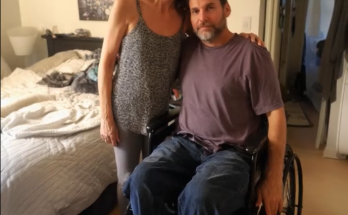
In a heartfelt and deeply personal interview with journalist Diane Sawyer, Emma Heming Willis opened up about the emotional and physical toll of caring for her husband, beloved actor Bruce Willis, as he battles frontotemporal dementia (FTD) — a cruel and progressive neurological disease that slowly erodes memory, language, and personality.
Emma spoke candidly about the early signs, the subtle but worrying changes that crept into their lives. At first, they were easy to dismiss — brief pauses in conversation, moments where Bruce seemed distant or disengaged. “There were just… silences,” she said, recalling family dinners and casual conversations that once echoed with Bruce’s signature humor and warmth, now replaced by a strange quietness. For a while, Emma hoped it might simply be hearing loss, the result of damage he’d sustained during a long career filled with loud action movie sets. But as his speech began to falter and his once-vibrant personality started to dim, she realized something far more serious was unfolding.
The diagnosis of frontotemporal dementia shattered the world they knew. It didn’t just change Bruce’s reality — it reshaped their entire family, their relationships, and their understanding of love and connection. Emma described how, over time, their marriage took on a new shape. “It didn’t feel like a marriage anymore,” she said softly, explaining how she began to transition from being a wife to becoming Bruce’s full-time caregiver — a role filled with both heartbreak and purpose.
The shift was overwhelming. Yet through it all, Emma remained determined to give Bruce the best care possible, not just for him, but for the sake of their two young daughters, Mabel and Evelyn. After long consideration, Emma made one of the most difficult decisions of her life: she moved Bruce into a specialized care home located close to the family — a place designed to meet the needs of people living with dementia.
She is quick to clarify that it’s not a cold, sterile institution. “It’s not a facility,” she says. “It’s a sanctuary. It’s full of love, music, and familiarity.” Friends, family, and staff surround Bruce with laughter, compassion, and structure. Emma visits often, along with the girls, ensuring that Bruce still feels the warmth of his family’s presence, even as his understanding of the world begins to fade.
Although Bruce’s cognitive abilities continue to decline, his physical health remains relatively strong, a trait not uncommon with this form of dementia. Emma cherishes the small moments of recognition that still break through the fog: the firm squeeze of her hand, a returned hug, a smile when their daughters enter the room, or a soft kiss that carries the memory of their love. “I know he knows us,” Emma says, her voice filled with quiet certainty and unwavering belief.
Out of this personal journey — marked by grief, change, and resilience — Emma has found a new purpose. She has become an advocate for other families facing similar paths, choosing to speak publicly about what it’s like to care for someone with frontotemporal dementia. She has been open not only about the disease but also about the emotional complexities of caregiving — the loneliness, the exhaustion, the moments of doubt, and the unexpected strength that emerges when you show up, day after day, for someone you love.
In her upcoming book, titled The Unexpected Journey: Finding Strength, Hope, and Yourself on the Caregiving Path, Emma offers an honest and deeply compassionate reflection on her experience. It’s part memoir, part guide — a resource for others who are navigating life as caregivers. Through its pages, she shares the realities many are too afraid to voice: the fear, the sorrow, and the guilt, but also the powerful moments of connection, the lessons in patience, and the profound sense of purpose and love that can grow even in the hardest seasons.
Her message is both clear and comforting: You are not alone. No caregiver, no family, should have to face this difficult journey in isolation. By sharing her story, Emma hopes to build a community of support and understanding — a space where pain is honored, where love is central, and where caregivers can feel seen, heard, and supported.
As Bruce’s world grows smaller, Emma’s love continues to grow larger. She stands as a quiet yet powerful example of how love can evolve in the face of illness — not fading, but transforming. Even as words disappear, gestures remain. Even as roles shift, love deepens. And even as the man she married fades into someone new, Emma remains by his side, showing up, loving fiercely, and choosing presence over despair.
It is a portrait of devotion, grace, and extraordinary courage — and a reminder that even in silence, love still speaks.



